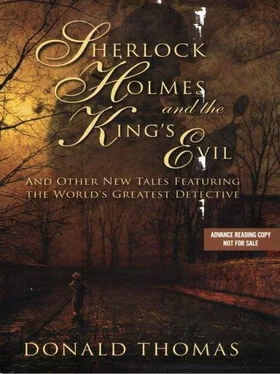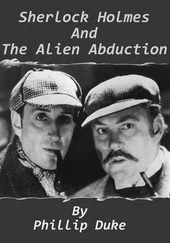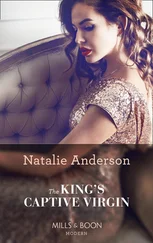
Donald Thomas
Sherlock Holmes and the King’s Evil
© 2009
For Robert, Peindre and Jane
I am most grateful for information on Byron’s handwriting from Dr Linda Shakespeare and for Charles Schlessiger’s fellow enthusiasm for the Great Detective.
I. The Case of the Tell-tale Hands
It was on a fine May morning in 1901 that Holmes and I first made the acquaintance of Raymond Ashley Savile, 3rd Earl of Blagdon. The Earl was in his mid-forties at the time of our meeting.
His grandfather, the 1st Earl of Blagdon, had gained a fortune and a title as the founder of Savile’s Commercial Bank in the City of London in 1839. In the heyday of Victoria ’s England, Savile’s Bank had been a name to conjure with. Plain old John Savile, before he acquired his earldom, made his first million in the railway boom of the 1840s. He then sold his shares in the Great North Eastern Railway and its rivals shortly before the bubble burst. Whatever his profit, he doubled it-and doubled it again-through his stake in Ocean Coal, as well as in several of the new “department” stores which graced London’s West End in the later decades of the nineteenth century.
The old man died in 1897 and was succeeded by his eldest son who outlived him only for a few months. It was old John Savile’s grandson who then became the 3rd Earl of Blagdon. By that time, as Sherlock Holmes remarked acidly, the aristocratic title had passed through three generations and had been washed clean of the whiff and taint of “trade.” In the House of Lords and elsewhere, Raymond Ashley Savile stood equal with the descendants of Plantagenet knights and Elizabethan statesmen.
The name most closely associated with the Savile family and its title as Earls of Blagdon was that of their country house, Priorsfield. It had been built no more than forty years before Holmes and I first saw it. Infinite pains had been taken to suggest that a 16th century chateau of the Loire had been whisked up and set down in a valley of the River Thames, half way between Oxford and London.
Priorsfield was soon brought to our attention and I must say a word about it. It was best seen from a distance, as passengers on the Oxford train glimpsed it across the Berkshire meadows beyond Windsor. Despite the best efforts of the architect and the builders, its French Renaissance design had too much of the “new” in its appearance to be anything but the plaything of commercial success. The dome between its round towers with their conical roofs might as easily have graced the Winter Gardens Pavilion or the Grand Hotel of a popular seaside resort.
Other stately homes might be known for suits of armour or the banners of chivalry. Priorsfield’s fame came from glass cases of Sèvres porcelain, from gold lustre centrepieces with fresh flowers down the length of polished dining tables and overblown garden scenes painted in oils. The Earls of Blagdon walked on flower-decorated carpets ordered by Louis XIV for the halls of Versailles.
Raymond Ashley Savile came to see Sherlock Holmes by appointment. He was a tall rather gaunt man, perhaps in his prime but already with a pronounced stoop. It was not only this stoop which made the fair-complexioned and clean-shaven aristocrat appear to bear the weight of the world on his shoulders. He glanced at me, uneasily as I thought, swept his long morning-coat about him and sat down. He turned to my friend.
“Mr Holmes, what I have to tell you must remain between ourselves.”
“Of course, my lord,” said Holmes courteously, “However you may speak as freely before Dr Watson as to myself. Indeed, it is advisable that you should do so. The resolution of most difficulties benefits from a second opinion. It is far better that my friend and colleague should hear of the matter from your own lips. Indeed, I would consider it essential.”
In this polite but inflexible manner, Sherlock Holmes had laid down the law to the aristocracy on many occasions. Lord Blagdon paused, as if he might even now stand up and take his leave. Then he sighed and began his explanation.
“Mr Holmes, you are probably aware that my father’s youngest brother was Lord Frederick Savile who together with his young wife was killed in the Clapham train crash of 1879.”
“Indeed, my lord,” said Holmes quietly.
“He left a five-year-old son, Lord Arthur Savile, who was brought up by my father as if he had been my younger brother rather than my cousin. We were not close, of course, because there was a gap of almost twenty years between us. However, I have always behaved towards him as though he were more than a young cousin. He will only carry the courtesy title of Lord Arthur Savile and therefore cannot inherit. However, I have seen to it that he need not want for money. He left Oxford without a degree but, curiously, he had the makings of a budding pianist. Were he not otherwise provided for-and had he the persistence-1 daresay he might have made a career in that way.”
“I take some interest in concert music,” said Holmes casually, “and have heard of Lord Arthur’s remarkable talent. I am sorry he has not cultivated it. His private impromptu performance at Priorsfield of Chopin’s C sharp minor study, several years ago, was described to me by the great Vladimir de Pachmann himself as a tour de force. It might not have done for him to play in public but he was a most accomplished performer.”
The Earl inclined his head in acknowledgement.
“It is a matter of character, Mr Holmes. Unfortunately it is not his accomplishments which are the subject of my present visit. To speak frankly he is better known in certain outlandish and Bohemian areas of London society than I should care to be. As for his music, he plays less and less, except occasionally in the company of his family. Let me be plain. I am attached to Lord Arthur and I have helped him, from time to time, as I have been able. But his conduct is become a matter of concern.”
Holmes raised one eyebrow.
“I cannot presume, my lord, to take your cousin’s conduct in hand.”
The Earl of Blagdon reassured him with a lift of the hand.
“I do not suggest that he is vicious or wild. There is nothing of drink, or gambling, or womanising. Rather, he is not merely eccentric but he seems to collect eccentricities for their own sake, if you follow me.”
“I believe I do, my lord.”
“I certainly could not say that he is insane. A man may believe that character can be determined through phrenology by reading the bumps of the skull, as he has done in extremes, and yet he is not insane. He may enlist in the ranks of those Rosicrucians known as The Magicians of the Golden Dawn; yet no alienist would lock him up in Bedlam. He may swear to the appearance of apparitions of the dead at the command of a spiritualist medium, yet that is his freedom of belief. It is when he becomes-shall I say a collector of such oddities?-that I am concerned for him.”
“Unless there be fraud or coercion of some kind,” said Holmes gently, “I doubt whether I am the right person to approach. Dr Watson, on the other hand…”
“What if it should touch upon crime?”
“That, of course, is a quite different matter.”
“What if he should burgle, by night, the houses of his own family? What if he should do it to no purpose? It is not only his eccentricities, though they are bad enough, but a growing oddity and perhaps criminality of conduct which brings me here.”
Holmes straightened in his chair.
“I think, my lord, that you had better explain that a little.”
Читать дальше













